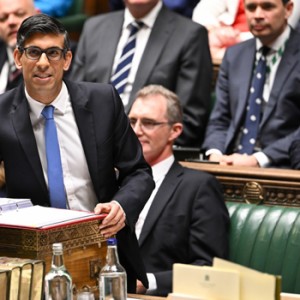There was absolutely nothing surprising about the outcome of the British general election on Thursday: As expected, the Labour Party won in a landslide, capturing 412 seats to the Conservative Party’s 121. By contrast, the French legislative election on Sunday was a shocker: After finishing first in the initial round of voting, the far-right National Rally plummeted to third, winning 143 seats, behind the left-wing New Popular Front (181 seats) and President Emmanuel Macron’s centrist coalition (more than 160). No party has won an absolute majority in the National Assembly. France might now face a period of political paralysis, but that’s better than the Marine Le Pen-led right-wing alternative.
Needless to say, there is no exact parallel between political developments in Europe and those in the United States, but there have been striking correlations in the past, particularly between British and U.S. politics. The populist victory of Brexit in 2016 presaged the populist victory of Donald Trump, while the 1992 election of “New Democrat” Bill Clinton presaged the 1997 election of Tony Blair and his “New Labour.” So, what lessons can we draw from the latest British and French election results?
First, the need for the center left and center right to work together to thwart extremists. That’s exactly what happened in France, with the New Popular Front and Macron’s party withdrawing third-place candidates in more than 200 constituencies where they might split the vote and award the seat to the National Rally. This is part of a political tradition in France — the “republican front” — that has prevented the far right from seizing power since the downfall of the Vichy regime in 1944.
There is no such tradition in the United States, where Trump and his MAGA crew have taken control of the Republican Party and might soon return to the White House. That is an appalling development, given that the MAGA faction is even more radical than the National Rally: While both groups are anti-immigrant, only the Trumpist wing of the GOP has supported an actual insurrection or promises to undermine democracy. The National Rally moved to the center by promising to support Ukraine and to stay in the European Union (although many wondered if they meant it), while Trump gives every indication that he might cut off Ukraine and leave NATO.
That Trump is so close to returning to power is a damning indictment not only of the Democratic Party — for nominating an enfeebled, inarticulate 81-year-old incumbent — but also of moderate Republicans for failing to do more to stop Trump. The best chance was during Trump’s second impeachment, when 57 senators, including seven Republicans, voted to convict him. But that was still 10 votes short of the 67 votes that would have been necessary to convict Trump and, on a separate vote, to disqualify him from running again.
If only Senate Minority Leader Mitch McConnell (R-Ky.) and other mainstream Republicans — who acknowledged that Trump was guilty of inciting an insurrection — had voted to convict, the nation would have been spared the potential cataclysm that now looms. Instead, mainstream conservatives put loyalty to the Republican Party above loyalty to the American republic.
A second big lesson of the past week concerns the potential appeal of centrism and competence as political antidotes to populism. The new British prime minister, Keir Starmer, took over a Labour Party in 2020 that had marginalized itself under the far-left leader Jeremy Corbyn. Starmer launched a purge of Corbyn loyalists, taking particular care to get rid of the antisemites who had been drawn to his predecessor’s anti-Israel agenda. Starmer, whose wife is Jewish, thereby signaled to voters that it was safe again to vote for Labour.
Starmer did not campaign on any radical agenda. Instead, in his first speech as prime minister, he promised to “rebuild Britain,” “restore service and respect to politics,” “end the era of noisy performance,” “tread more lightly on your lives” and “unite our country.” Those might seem like anodyne promises, but they were well received by an electorate exhausted by 14 years of Tory drama and dysfunction, which delivered Brexit and (not coincidentally) economic stagnation.
The British experience suggests that the best antidote to populism might simply be letting populists fail at governance. Even the Tories eventually turned on arch-populist Boris Johnson, who was prime minister from 2019 to 2022; he discredited himself with his mendacity and incompetence. His successors — Liz Truss and Rishi Sunak — were unable to rescue the Conservatives’ long-lost reputation as a serious governing party.
Given that Trump’s tenure was far more disastrous than Johnson’s, Democrats should be able to beat him again by advertising their centrism and their competence, as they did in 2020. Instead, Democrats are saddled with a nominee who is judged too old to serve another term by 74 percent of Americans. Biden Democrats are still far more centrist than Trump Republicans, but Democrats have somehow managed, at least for the time being, to squander their reputation as the party more capable of governing.
The third lesson of the recent elections concerns the power of an anti-incumbent message in a world still dealing with stagnant economic growth, rising income inequality, high rates of international migration and the lingering impact of inflation. Popular dissatisfaction and discontent are easily amplified by social media and manipulated by demagogues.
Both Sunak and Macron suffered major repudiation at the polls, even if Macron’s party managed to bounce back into a respectable second-place finish in the final vote. That seems to reinforce the lessons of the recent Indian and South African elections, where incumbent leaders also suffered electoral setbacks, forcing them into coalitions with other parties.
A Pew Research Center poll this year of 12 high-income countries found that 64 percent of respondents were dissatisfied with the way democracy was working. That’s a major turn for the worse since 2021, when 52 percent were dissatisfied. That poll found satisfaction even lower in the United States (at just 31 percent) than in Britain (39 percent) or France (35 percent).
That should have been a flashing red light for the Biden campaign this year even before the president’s debate calamity. Following the debate, it appears even more likely that the anti-incumbent mood will drag down the entire Democratic ticket unless the party can find a more inspiring nominee — either Vice President Harris or (even better) a governor or senator who is not associated with the incumbent administration.
The final electoral lesson concerns the importance in a democracy of the losing candidates gracefully accepting the outcome. Britain is a model in this regard: Shortly after Sunak realized that he would lose office, he told the nation, “Today power will change hands in a peaceful and orderly manner, with goodwill on all sides.” Jeremy Hunt, upon leaving office as chancellor, said, “Don’t be sad. This is the magic of democracy.”
That is how a nation bolsters support for its democracy. By contrast, Jordan Bardella, the 28-year-old president of the National Rally, blamed his party’s defeat on an “alliance of dishonor and the dangerous electoral arrangements.” Trump goes even further than Bardella: He still has not accepted the outcome of the 2020 election and has made clear that he is unlikely to accept the 2024 outcome, either, if he loses.
Trump thus fails a basic test of democratic leadership; if mainstream Republicans showed more devotion to U.S. democracy, they would disown him. But they haven’t, which is why the danger of a far-right takeover, just avoided in France, looms so large in November.
Washington Post














